Thank You Letter After Rejection
Dear [Recipient's Name],
I hope this letter finds you well. I wanted to take a moment to express my sincere gratitude for considering me as a candidate for the [Position Title] at [Company Name]. Although I recently received the news that I was not selected for the position, I wanted to extend my appreciation for the opportunity to be a part of your selection process and to learn more about [Company Name].
I am genuinely impressed by the professionalism and courtesy demonstrated throughout the application and interview process. The conversations I had with the hiring team were insightful and informative, and they only reaffirmed my interest in joining [Company Name]. The time and effort you dedicated to assessing my skills and qualifications are truly commendable.
While I am disappointed that I was not chosen for this particular opportunity, I wanted to assure you that I am genuinely appreciative of the experience and the chance to connect with such a reputable organization. The insights I gained about [Company Name]'s values, goals, and culture have further reinforced my belief that it is an exceptional place to work.
I remain genuinely interested in the work that [Company Name] is doing, and I am eager to explore potential opportunities to contribute to your team in the future. If there are any other positions or projects that align with my skills and qualifications, I would be grateful if you would keep me in mind for future openings. I believe that my experience and enthusiasm would enable me to make a meaningful contribution to [Company Name]'s success.
Once again, I want to express my gratitude for the time and consideration you extended to me throughout the selection process. I truly admire the work that [Company Name] is doing, and I wish you continued success in all your endeavors. Thank you for your kindness, and I hope our paths cross again in the future.
Warmest regards,
[Your Name]
Professional Thank You Letter After Job Rejection
Dear [Hiring Manager's Name],
Thank you very much for informing me about the outcome of my application for the [Job Title] position at [Company Name]. Although I am disappointed not to be selected, I sincerely appreciate the time and effort you and your team dedicated to reviewing my application and interviewing me.
I truly enjoyed learning more about [Company Name] and the exciting projects your team is leading. I hope we may have the opportunity to work together in the future, and I would be grateful if you could keep me in mind for any suitable openings down the line.
Thank you once again for your consideration and for the professional courtesy extended throughout the process.
Sincerely,
[Your Name]
Heartfelt Thank You Letter After University Rejection
Dear Admissions Committee,
I want to express my gratitude for reviewing my application for admission to [University Name]. Although I am disappointed by the decision, I am sincerely thankful for the opportunity to apply and for the thoughtful feedback provided.
The admissions process has given me valuable insight and motivation to continue striving toward my academic and personal goals. I remain inspired by [University Name]'s mission and community, and I hope to find ways to contribute in the future.
Thank you once again for your time and consideration.
Warm regards,
[Your Name]
Casual Email Thank You After Project Proposal Rejection
Hi [Recipient's Name],
Thanks a lot for reviewing my project proposal for [Project Name]. I understand it wasn’t selected this time, but I truly appreciate the feedback and the chance to present my ideas.
I’m looking forward to refining my proposal and hope to collaborate on future opportunities. Your insights were really helpful and encouraging!
Best,
[Your Name]
Formal Thank You Letter After Grant Rejection
Dear [Grant Committee Name],
I would like to sincerely thank you for considering my application for the [Grant Name]. While I am naturally disappointed by the outcome, I greatly appreciate the thorough evaluation and the constructive comments provided.
The experience of applying has been invaluable, and I remain committed to pursuing [Research/Project Topic]. I hope to have the opportunity to submit future proposals for your consideration.
Thank you once again for your time and dedication.
Yours faithfully,
[Your Name]
Informal Thank You Message After Freelance Pitch Rejection
Hey [Client's Name],
Just wanted to say thanks for reviewing my pitch for [Project/Service]. Even though I didn’t get the gig, I appreciate the chance to put my ideas forward.
I hope we can collaborate on something in the future. Your feedback was super helpful!
Cheers,
[Your Name]
Simple Thank You Letter After Internship Rejection
Dear [Internship Coordinator's Name],
Thank you for considering my application for the [Internship Position] at [Company Name]. Although I am disappointed by the decision, I am grateful for the opportunity to learn about your organization.
I hope to stay in touch and possibly explore future opportunities. Your time and consideration are truly appreciated.
Sincerely,
[Your Name]
What / Why: Understanding Thank You Letters After Rejection
A Thank You Letter After Rejection is a formal or informal message sent after a candidate, applicant, or proposer has been turned down.
Purpose:
- Show gratitude for consideration despite the negative outcome.
- Maintain positive relationships for future opportunities.
- Leave a professional impression.
- Express continued interest or commitment where appropriate.
Who Should Send a Thank You Letter After Rejection
- Job applicants who were not selected.
- Students or candidates after university or scholarship rejection.
- Freelancers or vendors whose proposals were declined.
- Researchers after grant application rejection.
- Anyone seeking to preserve professional connections or goodwill after a negative outcome.
Whom to Address a Thank You Letter After Rejection
- Hiring managers, HR representatives, or recruiters.
- Admissions committees or university staff.
- Grant committees or funding bodies.
- Clients or decision-makers for project proposals.
- Ensure the letter is addressed to the person who communicated the decision whenever possible.
When to Send a Thank You Letter After Rejection
- Within 24–72 hours of receiving the rejection notice.
- After interviews, pitches, or proposal evaluations.
- After scholarship, grant, or academic admissions notifications.
- When maintaining networking relationships is beneficial.
- Any scenario where professional courtesy can help future opportunities.
How to Write and Send a Thank You Letter After Rejection
- Begin with gratitude for consideration or review.
- Acknowledge the outcome without expressing negativity.
- Highlight what you learned or valued from the process.
- Express hope for future opportunities or continued engagement.
- Choose the medium: Email for speed and digital communication, Letter for formal or printed contexts.
- Keep it concise, positive, and professional.
Formatting Guidelines for Thank You Letters After Rejection
- Length: 150–250 words, 3–5 short paragraphs.
- Tone: Respectful, positive, professional, or heartfelt depending on context.
- Wording: Avoid negativity; focus on gratitude and learning.
- Style: Formal for official applications, casual for informal or digital communication.
- Mode: Email preferred for quick responses, printed letter for formal or traditional contexts.
- Etiquette: Use proper salutations, avoid abbreviations, and proofread carefully.
Tricks and Tips for Thank You Letters After Rejection
- Personalize each letter; reference specific conversations or feedback.
- Keep it concise and focused on gratitude and professionalism.
- Avoid discussing disappointment or contesting the decision.
- Use a friendly but respectful tone for informal messages.
- Send promptly to ensure relevance and demonstrate attentiveness.
Common Mistakes to Avoid
- Ignoring the opportunity to send a letter entirely.
- Using a negative or resentful tone.
- Making the letter too long or unfocused.
- Failing to proofread or address the correct recipient.
- Forgetting to express interest in future opportunities or collaborations.
Elements and Structure of a Thank You Letter After Rejection
- Opening: Greeting and immediate expression of gratitude.
- Body: Acknowledgment of the outcome, mention of what was learned, or what was appreciated.
- Closing: Hope for future opportunities, continued engagement, or maintaining connection.
- Signature: Formal or casual, depending on the tone.
- Optional Attachments: None usually required unless specifically requested.
After Sending / Follow-up Actions
- No immediate follow-up is necessary unless feedback was requested.
- Maintain the connection via networking platforms or professional correspondence.
- Keep records of communication for future reference.
- Monitor future openings or opportunities for engagement with the same organization.
Requirements and Prerequisites Before Writing
- Confirm the recipient's correct name, title, and contact information.
- Understand the context of the rejection fully.
- Reflect on what was gained from the process to express sincere gratitude.
- Prepare a concise draft before finalizing the message.
- Choose the appropriate medium (Email vs. Printed Letter).
How Much / How Many
- Length: 1–2 concise pages for letters, 3–5 short paragraphs for emails.
- Number of letters: Typically one per rejection, addressed individually.
- Frequency: Only send once per rejection; do not resend.
FAQ About Thank You Letters After Rejection
Q: Is it necessary to send a thank you letter after every rejection?
A: While not mandatory, it is highly recommended for maintaining professionalism and relationships.
Q: Can I express disappointment in the letter?
A: Keep the tone positive; focus on gratitude and learning rather than dissatisfaction.
Q: Should I ask for feedback in the letter?
A: Only if appropriate and if you genuinely want constructive advice. Phrase politely.
Q: Can I use a casual tone?
A: Yes, for informal or digital interactions, but maintain respect and professionalism.
Q: How soon should I send it?
A: Ideally within 24–72 hours of receiving the rejection notice.
Compare and Contrast with Other Letters
- Unlike apology letters, the focus is not on admitting fault but expressing gratitude.
- Compared to follow-up letters, this letter does not request immediate action but may open doors for future interaction.
- Similar to networking letters, it helps preserve relationships despite a negative outcome.
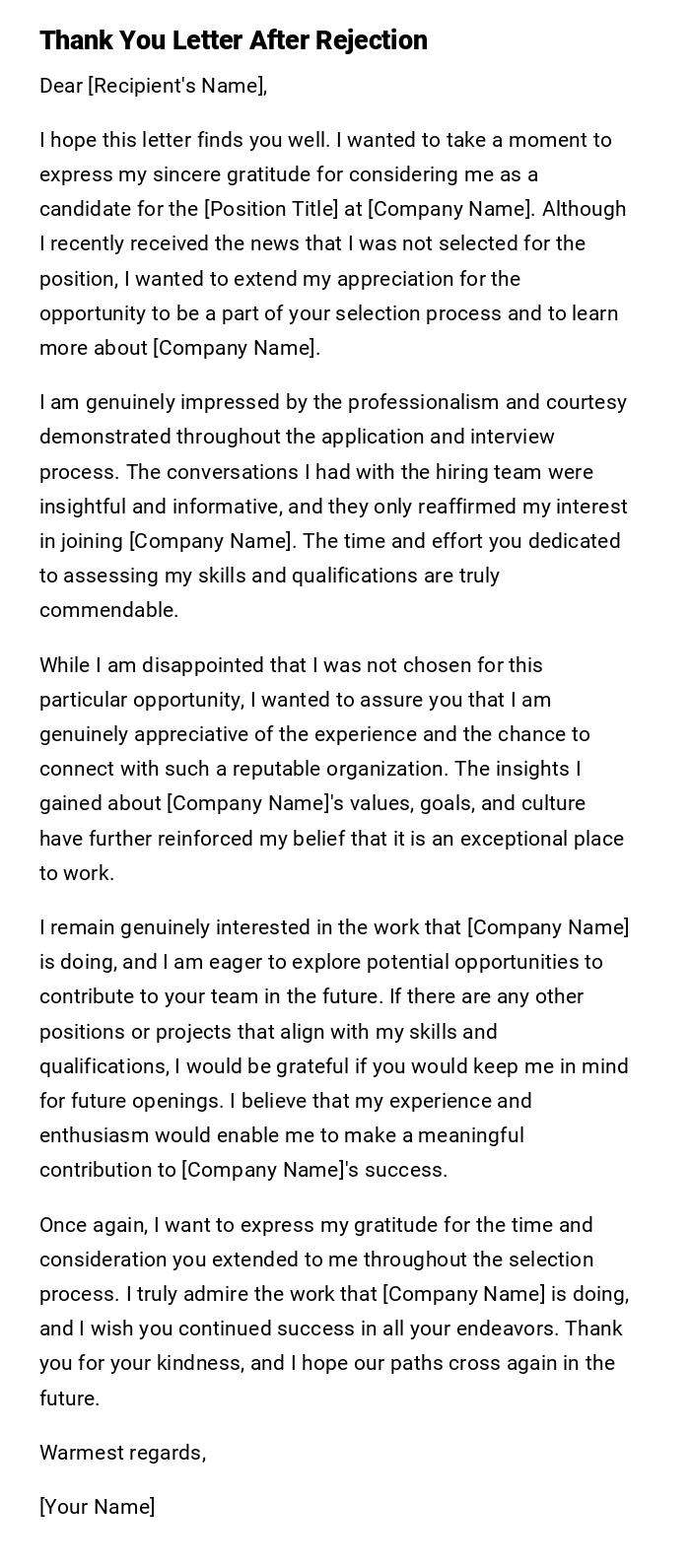
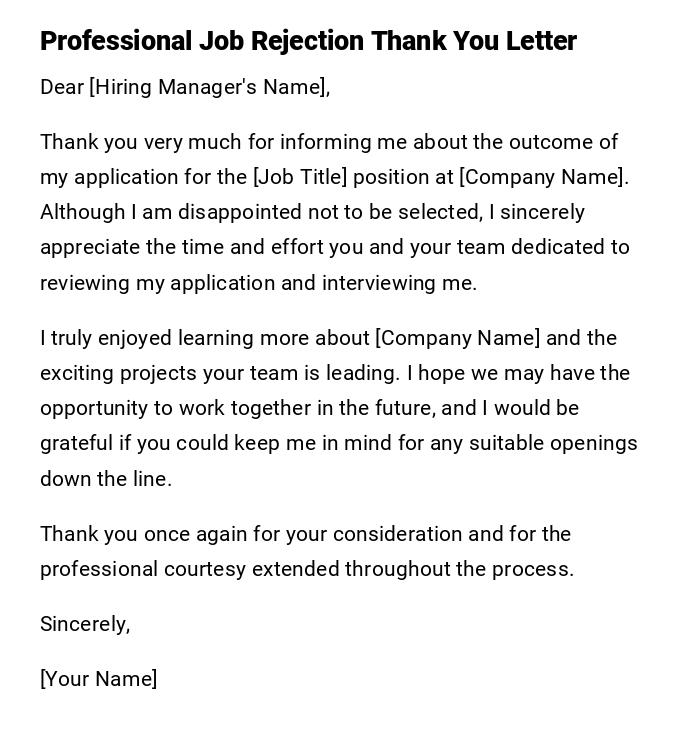
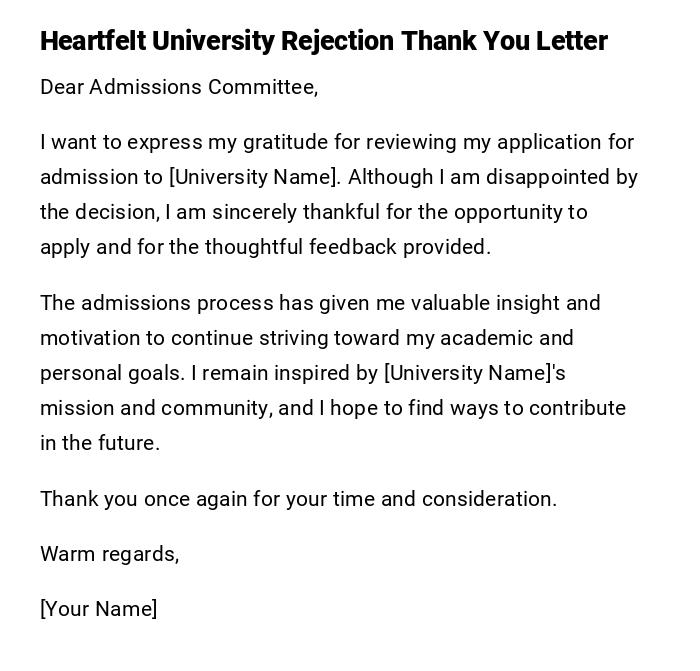
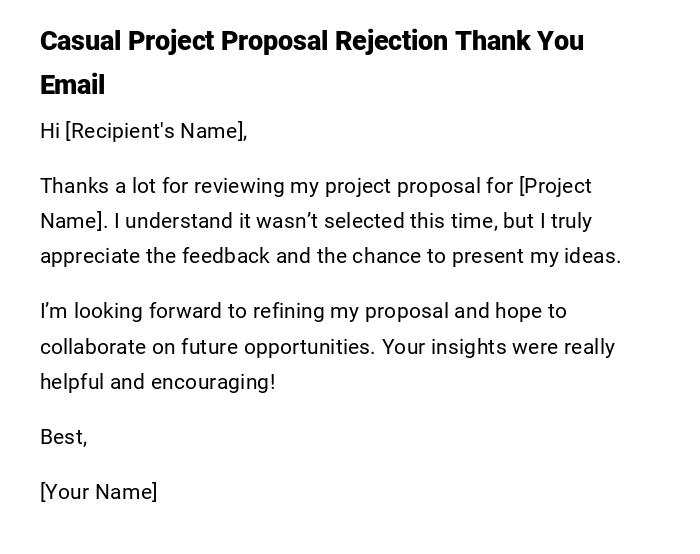
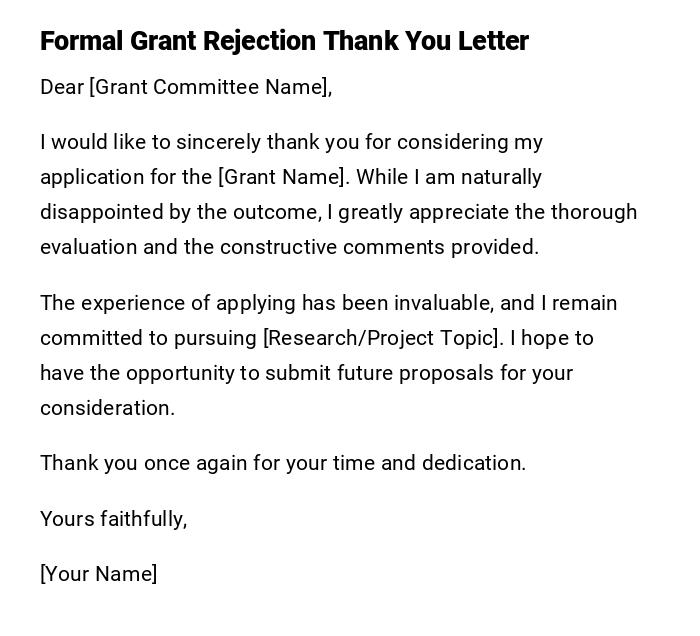
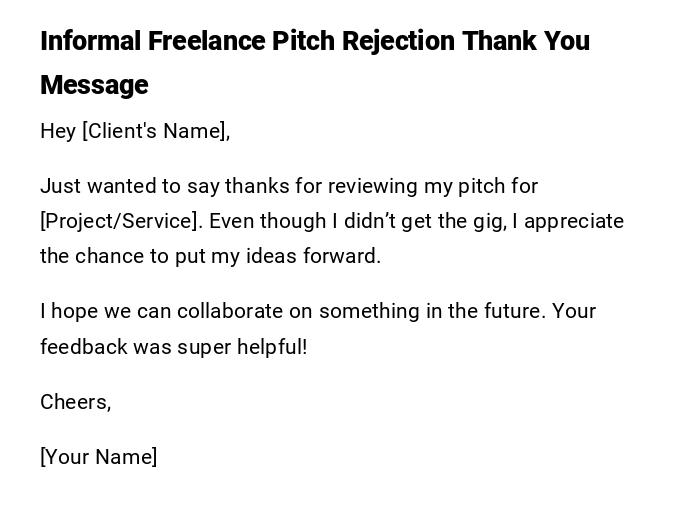
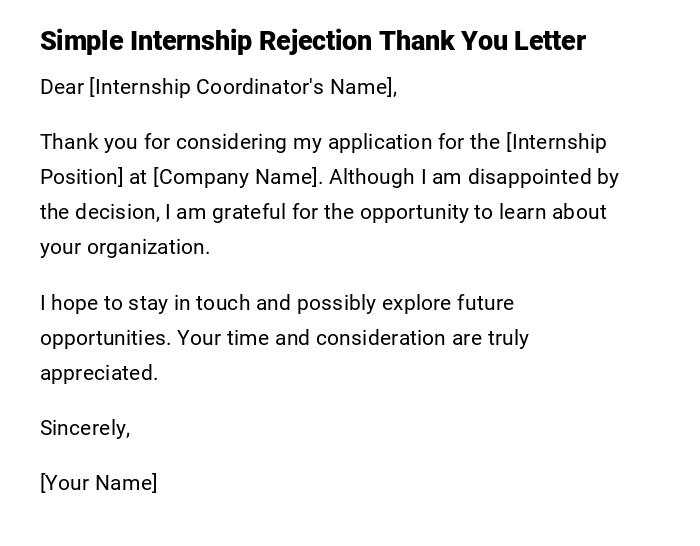

 Download Word Doc
Download Word Doc
 Download PDF
Download PDF